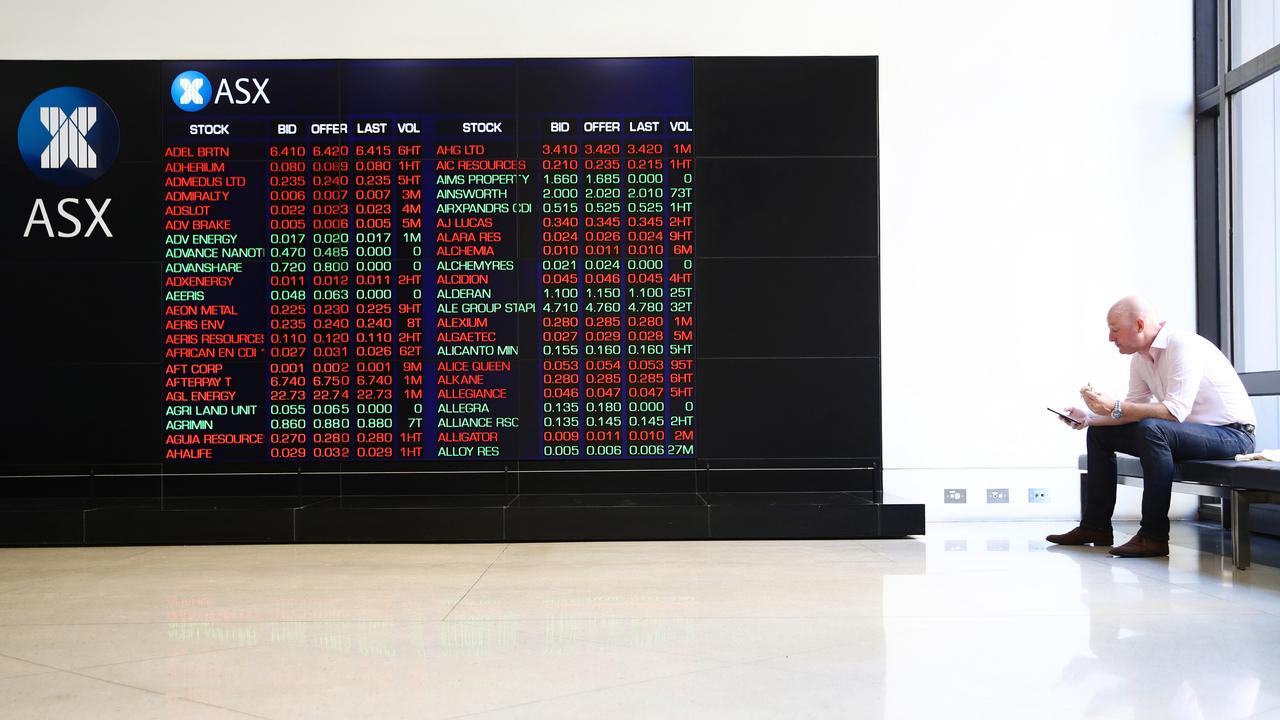Australian share market falls to fresh ‘horrific’ depths as coronavirus fears escalate
Analysts are running out of superlatives to describe the bloodshed inflicted on the ASX after the “ugliest day” of losses since the GFC.
The Aussie market had its worst day since the Global Financial Crisis, haemorrhaging “horrific” losses after a crude oil price plunge and escalation of the coronavirus stifled international economic growth.
The ASX200 tumbled 7.3 per cent to 5,760.6, shedding a whopping $147 billion and compounding the near-3 per cent fall from Friday.
CMC veteran market strategist Michael McCarthy said he’d only experienced a handful of days as destructive on the ASX in his 35-year career.
“But for a lot of investors it’s their first real experience of what is starting to look more and more like a market crash,” he told news.com.au at the close of trade.
“Ugliest single day drop we’ve seen since the GFC, coming after the worst week we’ve seen since the GFC.
“We’ve got an all-out panic.”
More than $440 billion has now been lost from the local market since it hit a record high of 7289.7 points on February 20.
Since then the ASX has fallen 19.6 per cent, a fraction short of being classified as a bear market — when stocks fall 20 per cent or more from a peak to trough.
Today, a plunging oil market coupled with an increasingly crippled economic supply channel due to virus-induced travel restrictions spurred a widespread sell-off.
RELATED: Aussie share market suffers heavy losses yet again
RELATED: Italy locks down 16 million people after death toll soars
RELATED: Infected man visited Sydney emergency department
Italy was thrown into chaos over the weekend after Prime Minister Giuseppe Conte announced a sweeping coronavirus quarantine, closing off a quarter of the country’s population including Milan.
But the real pain was reserved for spiralling crude prices, which at one point fell more than 30 per cent lower after Saudi Arabia slashed its export oil prices and stoked fears of a destructive price war with Russia.
“That was enough to spook investors and we’ve seen out-and-out selling across the board,” Mr McCarthy said.
Energy stocks crumbled after the hit to oil prices. Oil Search lost 35.2 per cent, Santos fell 27 per cent, while NRW Holdings, Worley, Beach Energy and Woodside Petroleum were all down just under 20 per cent.
The major banks were also smashed, with Westpac, ANZ and NAB sliding between 8.5 and 8.6 per cent while the Commonwealth Bank lost 6.5 per cent.
IG market analyst Kyle Rodda said he expected further losses to be inflicted from global markets in the week to come as wild volatility persists.
“The big concern ultimately for financial markets right now is you see a slowdown in global economic growth but also you raise the risk really quite considerably of some kind of credit crunch because of the stress a lower oil price will have on some very vulnerable companies in the United States,” he told news.com.au.
“The risk of financial contagion is probably the highest it’s been for a decade.”

Mr McCarthy agreed, saying the dramatic trajectory suggests there’s “further damage to come”.
“Markets rarely go anywhere in a straight line so we could see a bounce at some stage this week, but we’ve got a very clear downtrend in place, very strong downward momentum and a real commitment from sellers at volumes well above average,” he said.
“That suggests to me that although we might see some light relief at some stage this week, the arrows are all pointing down for the near term.”
Pepperstone head of research Chris Weston said US crude oil was “absolutely taken to the cleaners” based on the news out of the Middle East, which will further stifle investor confidence.
“I don’t think it’s going to be a particularly pretty picture,” Mr Weston told news.com.au.
“I can’t see it (the trading week) being anything but another horrific one and while energy is a smaller part of our market, the implications are far reaching.”
AUSSIE DOLLAR’S MINI CRASH
The Australian dollar had been tracking along unscathed considering the heavy losses inflicted on stocks until it dipped suddenly at about 12.30pm.
It lost about 4.9 per cent from buying 66 US cents right down to 64.50 in just 20 minutes.
AUD collapse possibly Made in Japan… No obvious news headlines to explain it. Kiwi also smashed along with oil-sensitive CAD, MXN, NOK #ausbiz pic.twitter.com/CTWOWExHcE
— Sean Callow (@seandcallow) March 9, 2020
This was enough to record a fresh decade low but Westpac senior currency strategist Sean Callow said it was likely in response to activity from Japan rather than anything related to Australia.
“The fact that the yen was strengthening at exactly the same time suggests it was probably Japanese investors who were selling the Aussie, buying back their yen, and closing out their positions,” he told news.com.au.
The Aussie dollar was buying 65.40 US cents at 4.21pm.
$120 billion wiped from the ASX this morning
— Alex Druce (@AlexDruuuce) March 9, 2020
That's 2.4 trillion Ghost Drops, in 1998-era rural primary school economics pic.twitter.com/HkPwgylANQ
HISTORICAL NIGHT: At its worst moment, just seconds after the opening, Brent oil fell 31.6%, the second largest one-day drop ever, only behind the plunge after the start of the Gulf War on Jan 17, 1991 | #OOTT FULL STORY: https://t.co/t7BK7jnr05 pic.twitter.com/YupFTtPwRt
— Javier Blas (@JavierBlas) March 9, 2020
The ASX rose 280 points over two sessions after the Reserve Bank of Australia governor Philip Lowe cut interest rates to a historic low of 0.5 per cent on Tuesday, and an amateur observer would be forgiven for dismissing the radical slump as just another rise and fall.
But Mr McCarthy says these erratic movements are significant and concerning.
“It tells you that we don’t know what’s going on and that’s the big issue for the market at the moment,” he told news.com.au. “It’s just the uncertainty of the economic impact of the virus.
“We get optimistic about potential central bank support and fiscal stimulus from governments, then we see another school close or another border shut and the sell-off comes.
“That uncertainty means the volatility is likely to continue and, unfortunately, the longer it lasts the more economic damage is done and the more likely we’ll see lower levels on the Australian share market.”

OIL PRICES PLUNGE
A dispute between oil producers has resulted in oil prices plunging and could lead to a global economy already spooked by the deadly coronavirus being awash in an oversupply of crude.
Brent Crude, the international standard, was more than 20 per cent lower this morning to $US35.77 a barrel, recovering slightly from a low not seen since 2016. Benchmark US crude fell to $US32.64.
Prices are falling as Saudi Arabia, Russia and other oil-producing countries argue how much to cut production in order to prop up prices.
Demand for energy is falling as people cut back on travel around the world. The worry is that the new coronavirus will slow economies sharply, meaning even less demand.
The Bloomberg commodity index is its lowest since July 1986, and close to its low since inception. pic.twitter.com/xwECK9Caag
— John Authers (@johnauthers) March 9, 2020
With wires




